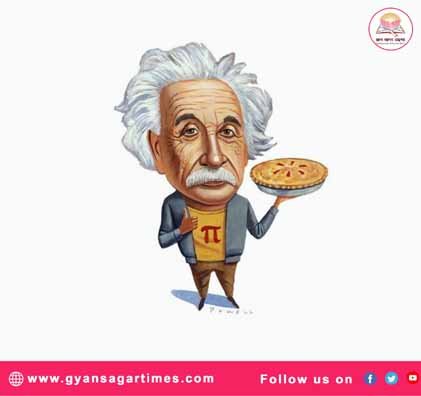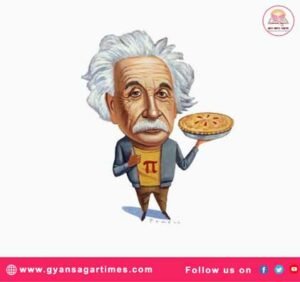
वैज्ञानिक अलबर्ट आइंस्टाइन
अल्बर्ट आइंस्टाइन का नाम विज्ञान की दुनिया में एक प्रतिभाशाली वैज्ञानिक के रूप में जाना जाता है. उन्हें आधुनिक भौतिकी का जनक माना जाता है, और उनके सिद्धांतों ने हमारे ब्रह्मांड को समझने का तरीका बदल दिया। आइंस्टाइन न केवल एक महान वैज्ञानिक थे, बल्कि एक दार्शनिक, शांतिवादी और मानवतावादी भी थे. उनका जीवन और कार्य आज भी दुनिया भर के लोगों को प्रेरित करता है.
अल्बर्ट आइंस्टाइन का जन्म 14 मार्च 1879 को जर्मनी के उल्म शहर में हुआ था. उनके पिता हरमन आइंस्टाइन एक इंजीनियर और व्यवसायी थे, जबकि उनकी माँ पॉलीन आइंस्टाइन एक संगीत प्रेमी थीं. आइंस्टाइन का बचपन से ही गणित और विज्ञान में गहरी रुचि थी. हालांकि, उन्हें स्कूल की पारंपरिक शिक्षा प्रणाली पसंद नहीं थी, और वे अक्सर अपने विचारों में खोए रहते थे.
वर्ष 1896 में, आइंस्टाइन ने ज्यूरिख के स्विस फेडरल इंस्टीट्यूट ऑफ टेक्नोलॉजी (ETH) में दाखिला लिया, जहाँ उन्होंने गणित और भौतिकी का अध्ययन किया. यहीं पर उनकी मुलाकात मिलेवा मैरिक से हुई, जो बाद में उनकी पहली पत्नी बनीं.
आइंस्टाइन ने अपने जीवन में कई महत्वपूर्ण वैज्ञानिक सिद्धांत प्रस्तुत किए, जिन्होंने भौतिकी की दुनिया में क्रांति ला दी. उनके कुछ प्रमुख योगदान निम्नलिखित हैं: –
- विशेष सापेक्षता सिद्धांत (1905): – इस सिद्धांत में आइंस्टाइन ने बताया कि समय और स्थान पूर्ण नहीं हैं, बल्कि वे प्रेक्षक की गति पर निर्भर करते हैं. इस सिद्धांत ने ऊर्जा (E) और द्रव्यमान (m) के बीच संबंध स्थापित किया, जो E=mc² के प्रसिद्ध समीकरण के रूप में जाना जाता है.
- सामान्य सापेक्षता सिद्धांत (1915): – इस सिद्धांत में आइंस्टाइन ने गुरुत्वाकर्षण को समझाने का एक नया तरीका प्रस्तुत किया. उन्होंने बताया कि गुरुत्वाकर्षण द्रव्यमान के कारण अंतरिक्ष-समय के वक्रता का परिणाम है.
- आइंस्टाइन ने वर्ष 1905 में फोटोइलेक्ट्रिक प्रभाव की व्याख्या की, जिसके लिए उन्हें वर्ष 1921 में नोबेल पुरस्कार से सम्मानित किया गया. उन्होंने बताया कि प्रकाश कणों (फोटॉन) के रूप में ऊर्जा लेकर चलता है, जिससे धातु की सतह से इलेक्ट्रॉन निकलते हैं। यह खोज क्वांटम यांत्रिकी के विकास में महत्वपूर्ण साबित हुई.
- आइंस्टाइन ने ब्राउनियन गति की व्याख्या की, जिससे परमाणुओं के अस्तित्व की पुष्टि हुई. इससे पदार्थ के अणु-परमाणु सिद्धांत को मजबूती मिली.
- भारतीय वैज्ञानिक सत्येंद्र नाथ बोस के साथ मिलकर आइंस्टाइन ने एक नई सांख्यिकी प्रस्तुत की, जो बोसॉन नामक कणों के व्यवहार को समझाती है. इसके आधार पर बोस-आइंस्टाइन कंडेनसेट की खोज हुई.
आइंस्टाइन न केवल एक वैज्ञानिक थे, बल्कि एक गहन विचारक और मानवतावादी भी थे. उन्होंने दुनिया भर में शांति और न्याय के लिए आवाज उठाई. वे नाजीवाद के खिलाफ थे और यहूदी होने के कारण उन्हें जर्मनी छोड़कर अमेरिका जाना पड़ा. उन्होंने परमाणु बम के विकास में भूमिका निभाने से इनकार कर दिया, हालांकि उनके सिद्धांतों ने परमाणु ऊर्जा के विकास में योगदान दिया.
आइंस्टाइन को संगीत से गहरा लगाव था, और वे वायलिन बजाने के शौकीन थे. उनका मानना था कि कल्पना और रचनात्मकता विज्ञान के लिए उतनी ही महत्वपूर्ण हैं, जितना कि तर्क और गणित. अल्बर्ट आइंस्टाइन का निधन 18 अप्रैल 1955 को प्रिंसटन, न्यू जर्सी में हुआ. उनकी मृत्यु के बाद भी, उनके सिद्धांत और विचार विज्ञान और दर्शन को प्रभावित करते रहे. उन्हें 20वीं सदी का सबसे महान वैज्ञानिक माना जाता है, और उनका नाम आज भी प्रेरणा का प्रतीक है.
अल्बर्ट आइंस्टाइन ने न केवल विज्ञान की दुनिया को बदल दिया, बल्कि उन्होंने मानवता के लिए एक नई दृष्टि भी प्रदान की. उनका जीवन और कार्य हमें यह सिखाता है कि जिज्ञासा, कल्पना और दृढ़ संकल्प के साथ हम दुनिया को बेहतर ढंग से समझ सकते हैं. आइंस्टाइन की विरासत आज भी हमें प्रेरित करती है कि हम ज्ञान के माध्यम से एक बेहतर भविष्य का निर्माण करें.
========== ========= ===========
Scientist Albert Einstein

Albert Einstein’s name is known in the world of science as a brilliant scientist. He is considered the father of modern physics, and his theories changed the way we understand our universe. Einstein was not only a great scientist, but also a philosopher, pacifist and humanitarian. His life and work still inspire people around the world.
Albert Einstein was born on 14 March 1879 in the city of Ulm, Germany. His father Hermann Einstein was an engineer and businessman, while his mother Pauline Einstein was a music lover. Einstein had a keen interest in mathematics and science since childhood. However, he did not like the traditional education system of school, and he was often lost in his thoughts.
In the year 1896, Einstein enrolled in the Swiss Federal Institute of Technology (ETH) in Zurich, where he studied mathematics and physics. It was here that he met Mileva Maric, who later became his first wife.
Einstein presented many important scientific theories in his life, which revolutionized the world of physics. Some of his major contributions are as follows: –
- Special Relativity Theory (1905): – In this theory, Einstein explained that time and spaces are not absolute, but they depend on the speed of the observer. This theory established the relationship between energy (E) and mass (m), which is known as the famous equation of E=mc².
- General Relativity Theory (1915): – In this theory, Einstein presented a new way to explain gravity. He explained that gravity is the result of the curvature of space-time due to mass.
- Einstein explained the photoelectric effect in the year 1905, for which he was awarded the Nobel Prize in the year 1921. He explained that light carries energy in the form of particles (photons), which causes electrons to come out of the metal surface. This discovery proved to be important in the development of quantum mechanics.
- Einstein explained Brownian motion, which confirmed the existence of atoms. This strengthened the atomic-molecular theory of matter.
- Along with Indian scientist Satyendra Nath Bose, Einstein presented new statistics, which explain the behaviour of particles called bosons. Based on this, Bose-Einstein condensate was discovered.
Einstein was not only a scientist, but also a deep thinker and humanitarian. He raised his voice for peace and justice around the world. He was against Nazism and being a Jew, he had to leave Germany and go to America. He refused to play a role in the development of the atomic bomb, although his theories contributed to the development of nuclear energy.
Einstein had a deep love for music, and he was fond of playing the violin. He believed that imagination and creativity are as important to science as logic and mathematics. Albert Einstein died on 18 April 1955 in Princeton, New Jersey. Even after his death, his theories and ideas continued to influence science and philosophy. He is considered the greatest scientist of the 20th century, and his name continues to inspire today.
Albert Einstein not only changed the world of science, but he also provided a new vision for humanity. His life and work teach us that with curiosity, imagination, and determination we can better understand the world. Einstein’s legacy continues to inspire us to build a better future through knowledge.





